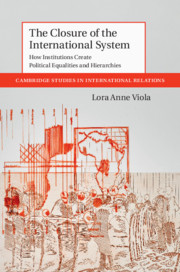 The Closure of the International System
The Closure of the International System Book contents
- The Closure of the International System
- Cambridge Studies in International Relations: 153
- The Closure of the International System
- Copyright page
- Dedication
- Contents
- Acknowledgments
- 1 False Promises of Universalism
- 2 The Closure Thesis
- 3 “The Master Institution”
- 4 “Dwarves and Giants”
- 5 “In Larger Freedom”
- 6 What Remains of the Promise of Equality?
- References
- Index
- Cambridge Studies in International Relations
1 - False Promises of Universalism
The Interdependent Logics of Equality and Inequality in the International System
Published online by Cambridge University Press: 16 June 2020
- The Closure of the International System
- Cambridge Studies in International Relations: 153
- The Closure of the International System
- Copyright page
- Dedication
- Contents
- Acknowledgments
- 1 False Promises of Universalism
- 2 The Closure Thesis
- 3 “The Master Institution”
- 4 “Dwarves and Giants”
- 5 “In Larger Freedom”
- 6 What Remains of the Promise of Equality?
- References
- Index
- Cambridge Studies in International Relations
Summary
The international relations (IR) literature appears to be divided into two fundamentally different views about the basic structure of the international system and its institutions. On one view, the expansion and opening of international institutions in the 20th Century to include more actors and greater geographical reach, combined with strengthening democracy norms, are driving the democratization of international institutions. At the same time, a more critical literature is emerging that instead views the system as permeated by multiple forms of hierarchy and deep structures of domination. This chapter, in contrast, argues that political equality and inequality obstinately co-exist in international institutions because of their very role in regulating access to collective goods. It develops what I call the closure thesis to explain how institutional designs reflect an ongoing struggle between the assertion of equal rights and the preservation of unequal privileges. This argument requires re-thinking three premises: that equality and inequality are antagonistic; that greater inclusiveness typically promotes a move towards greater equality; and that international institutions provide global public goods. This chapter elaborates on these points, situates them in the literature, introduces the closure thesis, and outlines the rest of the book.
Keywords
- Type
- Chapter
- Information
- The Closure of the International SystemHow Institutions Create Political Equalities and Hierarchies, pp. 1 - 41Publisher: Cambridge University PressPrint publication year: 2020
